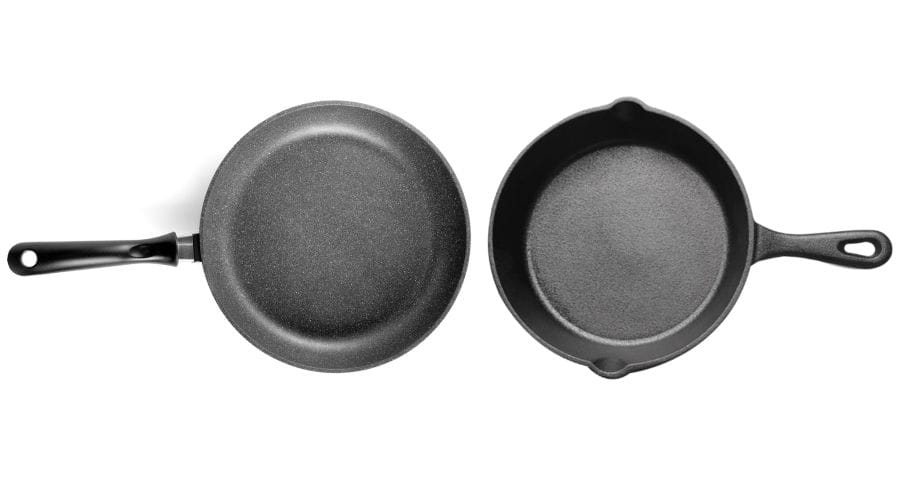Nonstick cookware is a popular choice for many people because it is easy to use and clean.
However, some people believe that cast iron cookware is a better option because it is healthier and more durable.
Cast iron cookware is often considered a better option than non-stick because it doesn’t release harmful chemicals when heated.
But is cast iron really better?
Or are there benefits to using non-stick cookware instead?
Which type of cookware should you choose? Here is a comparison of nonstick vs cast iron cookware to help you decide.
Let’s take a closer look at the pros and cons of both options.
Contents
Non-Stick vs Cast Iron: Detailed Guide
What is Cast Iron
Cast iron cookware is made from, well, cast iron. It is a very heavy material that can last for decades if it is properly cared for.
Cast iron has superior heat retention properties, so it can be used on any cooking surface, including the stovetop, in the oven, or even over an open flame.
Cast iron cookware is also very versatile.
It can be used to fry, sauté, bake, broil, or roast foods.
Because of its thickness, it is an excellent choice for slow cooking and braising meats.
And, it can even be used to make desserts like cobblers and pies.
Pros Of Cast Iron
Here are top 10 advantages of using cast iron cookware:
- It is very durable and can last for many years.
- Cast iron is a natural material that is non-toxic and safe to use.
- It is an excellent conductor of heat and cooks food evenly.
- Cast iron cookware is relatively inexpensive.
- It can be used on all cooking surfaces, including induction cooktops.
- Cast iron pots and pans are oven-safe and can be used for baking.
- It adds iron to your diet, which is beneficial for some people.
Cons of Cast Iron
- This is probably the most significant disadvantage of cast iron cookware. It is much heavier than other materials such as aluminum or stainless steel.
- Cast iron pots and pans can rust if they are not properly seasoned or if they are left wet.
- You should never wash cast iron cookware in the dishwasher. Doing so will strip away the seasoning and cause the cookware to rust.
- Cast iron must be seasoned (coated in oil) to prevent rusting.
- Cast iron takes longer to heat up than other materials, but it retains heat well. This means that you need to be careful not to overcook food or burn yourself.
- If not properly cared for, cast iron can be difficult to clean. However, there are many tips and tricks for cleaning cast iron.
What is Nonstick Cookware?
When it comes to nonstick cookware we have different types of materials that can be used to make the cookware.
The most popular type of nonstick cookware is made with Teflon. Teflon is a material that is created by DuPont and it is a synthetic polymer.
There are other types of nonstick coatings that can be found on cookware as well such as silicone, enamel, anodized aluminum, and ceramic.
But our focus will be Teflon as it is the most popular. Teflon is a very slippery material and because of this, it can be used as a nonstick coating for cookware.
Teflon
Teflon is applied to the cookware in a process called PTFE (polytetrafluoroethylene) coating. This process was created by DuPont in the 1940s.
Non-stick cookware is coated with a material, Teflon prevents food from sticking to the surface of the pan.
This makes it very easy to use and clean. Non-stick cookware is also lightweight, which makes it easier to handle than cast iron.
Nonstick cookware is a good choice for cooking eggs, flipping pancakes or making omelets because food slides right out of the pan.
It is also a good choice for cooking delicate fish or chicken breasts that might stick to and tear apart on a cast iron surface.
However, nonstick cookware is not recommended for cooking at high temperatures because the nonstick coating can break down and release harmful chemicals into food.
Pros of Non-Stick
- Because food doesn’t stick to the surface, nonstick cookware is very easy to clean. You can usually just wipe it out with a paper towel or wash it with soap and water.
- Nonstick cookware is usually made from aluminum, which is a light metal. This makes it easier to lift and handle than heavier cookware, such as cast iron.
- When used correctly, nonstick cookware is safe to use. The nonstick coating won’t flake off and contaminate food.
- However, if the nonstick coating is damaged, it can release harmful chemicals into food.
Cons of Non-Stick
- The nonstick coating can eventually wear off with use. Once the coating is gone, the cookware is no longer nonstick.
- The nonstick coating can start to break down and release harmful chemicals into food when heated to high temperatures. So, it’s best to avoid using nonstick cookware for cooking methods that require very high heat, such as broiling and stir-frying.
So, which one is best to use Cast Iron Vs Non-Stick?
The answer may depend on your needs and preferences. If you are looking for cookware that is easy to use and clean, then non-stick may be the best option for you.
But if you want cookware that is durable and can be used for a variety of cooking methods, then cast iron may be a better choice.
When it comes to non-stick vs cast-iron cookware, it really depends on your needs and preferences as to which one is better.
If you want something that is easy to use and clean, then non-stick cookware is probably the way to go.
But if you want something that is durable and can be used for a variety of different cooking methods, then cast iron might be

